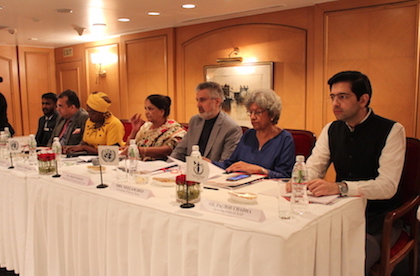An upending of the global order
This is a time of transition. A new international order is emerging with many discontinuities--and a collaboration of efforts is needed for it to be better than the one that is fragmenting
 Courtesy: Government Law College
Courtesy: Government Law College
This is a time of transition. A new international order is emerging with many discontinuities--and a collaboration of efforts is needed for it to be better than the one that is fragmenting
Zeti Akhar Aziz, economic advisor to newly elected Malaysian Prime Minister, Mahathir Bin Mohamad, believes that economic policy should be rooted in moral and religious ideas
The 44th G7 summit, held in Canada in the first week of June, ended on a tense, disunited note—not unlike the premise of Richard Haass’ 2017 book, The World in Disarray: American Foreign Policy and the Crisis of the Old Order. In this interview, the President of the Council on Foreign Relations discusses the role of international institutions, World Order 2.0 and how India can participate in it
Gateway House spoke to Toshinori Doi, President, Policy Research Institute, Japan, on the sidelines of the Gateway of India Geoeconomic Dialogue, on the risks associated with digitising finance, the Belt and Road Initiative and dealing with Chinese market dominance
One of the priorities of the Asian Infrastructure Investment Bank (AIIB), which held its third annual meeting in Mumbai earlier this week, is to mobilise more private capital for infrastructure and support sustainable projects
Marina Kaljurand, Chair, Global Commission on Stability of Cyberspace, Brussels, Belgium, said governments had to collaborate closely with lawyers, and the private sector, which is leading some major developments
India and the world have watched China’s growing investment in Asia and beyond with a mix of awe and apprehension. The unprecedented scale of these investments are reshaping political arrangements around South Asia.
Rasha Omar, agricultural economist and Country Representative, Asia and the Pacific Division, International Fund for Agriculture Development, attended the Think20 Meeting in Mumbai. In an interview, she offers some prescriptions on how to reduce rural poverty in India
Gateway House co-hosted the Think20 Mumbai meeting on 12 March 2018. It brought together prominent experts, academics and senior government representatives. In a series of interviews conducted by Gateway House during the conference, Shaktikanta Das, India’s G20 Sherpa, spoke on India's role in the G20 process and its role in the multilateral institution
K.P. Krishnan, Secretary, Ministry of Skill Development and Entrepreneurship & Chairman, National Skill Development Agency (NSDA), Government of India, discusses the formidable task of upgrading India’s skills deficit swiftly and inclusively